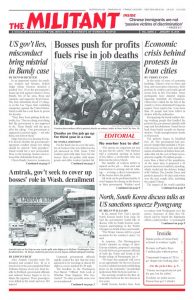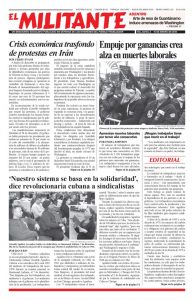Below is an excerpt from “Culture and Socialism,” an essay in Art and Revolution by Leon Trotsky, one of Pathfinder’s Books of the Month for January. Trotsky was one of the central leaders of the 1917 Russian Revolution. The essay is based on lectures given by Trotsky in 1926 that were originally published in Krasnaya Nov, number 6. Copyright © 1970 by Pathfinder Press. Reprinted by permission.
BY LEON TROTSKY
Let us recall first of all that culture meant originally a plowed, cultivated field, as distinct from virgin forest and virgin soil. Culture was contrasted with nature, that is, what was acquired by man’s efforts was contrasted with what was given by nature. This antithesis fundamentally retains its value today. …
When we speak of the culture accumulated by past generations we think first and foremost of its material achievements in the form of tools, machinery, buildings, monuments, and so on. Is this culture? Undoubtedly it is culture; the material forms in which culture is deposited — material culture. It creates, on the basis provided by nature, the fundamental setting of our lives, our everyday way of living, our creative work. But the most precious part of culture is its deposit in the consciousness of man himself —those methods, habits, skills, acquired abilities of ours which have developed out of the whole of preexisting material culture and which, while drawing on this preexisting material culture, also improve upon it. We will, then, consider it as firmly established that culture has grown out of man’s struggle with nature for existence, for the improvement of his conditions of life, for the enlargement of his power. But out of this same basis classes also have grown. In the process of adapting itself to nature, in conflict with the hostile forces of nature, human society has taken shape as a complex organization of classes. The class structure of society has determined to a decisive degree the content and form of human history, that is, its material relations and their ideological reflections. This means that historical culture has possessed a class character.
Slave-owning society, feudal serf-owning society, bourgeois society, each engendered a corresponding culture, different at different stages and with a multitude of transitional forms. Historical society has been an organization for the exploitation of man by man. Culture has served the class organization of society. Exploiters’ society has given rise to an exploiters’ culture. But does this mean that we are against all the culture of the past?
There exists, in fact, a profound contradiction here. Everything that has been conquered, created, built by man’s efforts and which serves to enhance man’s power is culture. But since it is not a matter of individual man but of social man, since culture is a social-historical phenomenon in its very essence, and since historical society has been and continues to be class society, culture is found to be the basic instrument of class oppression. Marx said: “The ruling ideas of an epoch are essentially the ideas of the ruling class of that epoch.” This also applies to culture as a whole. And yet we say to the working class: master all the culture of the past, otherwise you will not build socialism. How is this to be understood?
Over this contradiction many people have stumbled, and they stumble so frequently because they approach the understanding of class society superficially, semi-idealistically, forgetting that fundamentally this is the organization of production. Every class society has been formed on the basis of definite modes of struggle with nature, and these modes have changed in accordance with the development of technique. What is the basis of bases — the class organization of society or its productive forces? Without doubt the productive forces. It is precisely upon them, at a certain level of their development, that classes are formed and re-formed. In the productive forces is expressed the materialized economic skill of mankind, his historical ability to ensure his existence. On this dynamic foundation there arise classes, which by their interrelations determine the character of culture.
And here, first and foremost, we have to ask ourselves regarding technique: is it only an instrument of class oppression? It is enough to put such a question for it to be answered at once: no, technique is the fundamental conquest of mankind; although it has also served, up to the present, as an instrument of exploitation, yet it is at the same time the fundamental condition for the emancipation of the exploited. The machine strangles the wage slave in its grip. But he can free himself only through the machine. Therein is the root of the entire question. …
Art is one of the ways in which man finds his bearings in the world; in this sense the heritage of art is not distinguished from the heritage of science and technique — and it is no less contradictory than they. Unlike science, however, art is a form of cognition of the world not as a system of laws but as a group of images, and at the same time it is a way of inspiring certain feelings and moods. The art of past centuries has made man more complex and flexible, has raised his mentality to a higher level, has enriched him in an all-round way. This enrichment is a precious achievement of culture. Mastery of the art of the past is, therefore, a necessary precondition not only for the creation of new art but also for the building of the new society, for communism needs people with highly developed minds. …
Culture is a social phenomenon. Just because of this, language, as the organ of intercourse between men, is its most important instrument. The culture of language itself is the most important condition for the growth of all branches of culture, especially science and art. Just as technique is not satisfied with the old measuring apparatus but is creating new ones, micrometers, voltameters, and so on, striving for and attaining ever greater accuracy, so in the matter of language, of skill in choosing the appropriate words and combining them in the appropriate ways, constant, systematic, painstaking work is necessary in order to achieve the highest degree of accuracy, clarity and vividness. The foundation for this work must be the fight against illiteracy, semiliteracy and near-illiteracy. The next stage of this work is the mastering of Russian classical literature.
Yes, culture was the main instrument of class oppression. But it also, and only it, can become the instrument of socialist emancipation.

